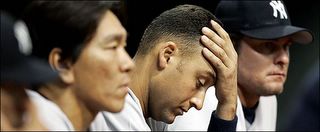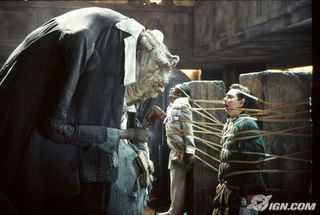Notes on Terry Pratchett's Small Gods.
I realized while penning this that some might find it incongruous that I'm writing a book review for a thirteen year old novel. My reply to that would be twofold: first ( and most infantile)--it's my blog, and I can do whatever I want and; I usually write book reviews for 400 year year old plays, so this is in fact pretty cutting edge stuff for me.
I have found a stand-in for my deceased hero Douglas Adams; his name is Terry Pratchett. I've just finished my first of his 30 or so Discworld novels, 1992's Small Gods and was so impressed that I sped down to my school library to get another work from the series.
Discworld is a flat planet (tee hee) that rests atop four elephants, who stand atop a giant turtle swimming its way through the cosmos. There exists a religion that is convinced that the world is in fact spherical and consider the correct flat-planet cosmology a capital heresy. (But is there really any other kind?) And it's that kind of tongue-in-cheek stuff that defines the whole series.
"Series" is a bit of a misnomer, unless one thinks in terms of a television series. The books have recurring characters and the same setting, but are not really sequential and do not require reading in any particular order. Small Gods occurs midway through the series, but one misses nary an important bit of information on that account. The novel is, like all discworld novels, a satire--in this instance an incisive send-up of faith and religion. The action is set in the brutal theocracy of Omnia, a place where philosophical reflection, science, and dissident views of cosmology are all...frowned upon. Our hero is an illiterate novice cleric by the name of Brutha, kind, faithful and obedient, with the peculiar added quality that he has perfect recall of everything he has witnessed since birth. The villain, if he can be called that, is Vorbis, a priest of the Quisition, the body appointed to maintaining theological orthodoxy, mainly by mass torture and executions. Throw in a once-mighty god regrettably trapped in tortoise form, a truly funny parody of ancient Greece, and a little bit of Zen addended for good measure, and you have the makings of a broad but tightly focused and oddly compelling plot. The 357 pages are gone in what seems like the time required for a weekday NY Times. It's something that The Hitchhiker's Guide to the Galaxy books never had; while they lampooned the same theological constructs, the plots were typically little more than a loosely connected series of events used as a pretext for Adams' fanciful digressions. With Pratchett, you get an actual structure to complement the sarcasm.
The genius of this book, though, is how effortlessly and whimsically--yet effectively--it addresses the nature of religion, the natural excesses and peculiarities it accrues with age, the nature of physical versus spiritual truth, the meaning of divinity, and the corruption of human motives. We are asked questions like--what if gods need our belief more than we need their providence? Why are the most unshakeable of faith the most dangerous individuals in a society? How do successful religions come about, and how do established ones die? You won't catch half of it until after you finish, because you've been so thoroughly diverted and busy laughing througout the narrative.
It's as if the reader has been tricked into reading something fairly serious and exceptionally well-crafted against his will. In the end, the effect is like listening to a pastoral symphony: drawn in by the light rythms and pleasant melody, you don't realize how complex what you've heard really is. It's a fine novel and I highly recommend it.











